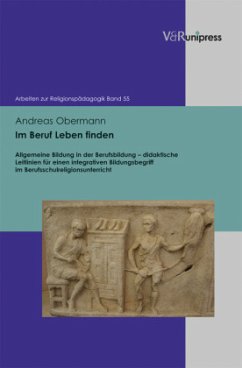Der Berufsschulreligionsunterricht (BRU) hat seinen spezifischen Ort in der Berufsbildung und leistet einen eigenständigen Beitrag zur Erlangung einer umfassenden beruflichen Handlungsfähigkeit. Besonders die nachlassende Orientierungsfunktion des »Berufes« als Leitkategorie des menschlichen Lebens ist eine große theologische Herausforderung für den BRU bietet aber zugleich neue Möglichkeiten für dessen Gestaltung. Berufsbildung und Allgemeinbildung gehören integrativ zusammen: Eine Allgemeinbildung ohne berufliche Fokussierung droht perspektivlos zu werden, während eine Berufsbildung ohne Einbeziehung der Auszubildenden als Persönlichkeiten Gefahr läuft, leblos zu werden. Eine Bildung im BRU, die diese beiden Aspekte integriert, zielt auf eine Entwicklung der Auszubildenden zu einer mündigen Persönlichkeit und ermutigt zur Gestaltung des Lebens im beruflichen, privaten und gesellschaftlichen Kontext. Dieser Band zeigt die Notwendigkeit eines integrativen Berufsbildungsunterrichts auf und entwirft Leitlinien für dessen didaktische Praxis.
Religious Education in colleges has a specific place within Further Education and provides a contribution in its own right for an all round professional ability. A great theological challenge for RE in FE is the ever decreasing purpose of the profession as a guide for life. In reflecting on one s own reasonable life style, its environment and society in general it enables RE in FE to come into its own and offer a specific theological topic. Further Education and General Knowledge belong together in an integrated way: General Knowledge without any professional focus tends to lose its perspective in the same way that vocational training without the inclusion of the personality of the trainee is in danger of becoming lifeless. The aim of the integrated process in vocational training is to strengthen the individual s abilities. An integrated education aspires to the overall training of students which is aimed at developing mature personalities and an active life style in the professional, private and the wider social context. An understanding of integrated training evens out social differences and offers a contribution to a higher educational justice.
Religious Education in colleges has a specific place within Further Education and provides a contribution in its own right for an all round professional ability. A great theological challenge for RE in FE is the ever decreasing purpose of the profession as a guide for life. In reflecting on one s own reasonable life style, its environment and society in general it enables RE in FE to come into its own and offer a specific theological topic. Further Education and General Knowledge belong together in an integrated way: General Knowledge without any professional focus tends to lose its perspective in the same way that vocational training without the inclusion of the personality of the trainee is in danger of becoming lifeless. The aim of the integrated process in vocational training is to strengthen the individual s abilities. An integrated education aspires to the overall training of students which is aimed at developing mature personalities and an active life style in the professional, private and the wider social context. An understanding of integrated training evens out social differences and offers a contribution to a higher educational justice.

